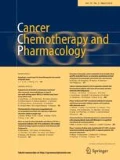Abstract
Purpose
Effective treatment options for patients with metastatic breast cancer pretreated with or resistant to anthracyclines and taxanes are limited. Ixabepilone has single-agent activity in these patients and has demonstrated synergy with capecitabine in this setting. This study was designed as a prospective clinical trial to evaluate the efficacy and safety of ixabepilone plus capecitabine in both anthracycline-pretreated and resistant and taxane-resistant metastatic breast cancer of Chinese women.
Patients and methods
Patients with measurable disease who had anthracycline and taxanes as prior neoadjuvant, adjuvant or metastatic therapy were treated with ixabepilone at 40 mg/m2 intravenously on day 1 of 21-day cycle plus capecitabine 2,000 mg/m2 orally on day 1 through 14 of a 21-day cycle. The primary end point was the objective response rate. The secondary end points were time to progression, overall survival, and toxicity profiles.
Results
Twenty-one patients received 146 cycles with a median of 5 cycles (range 1–13 cycles) per patients. Fourteen patients (66.7%) had partial response, 5 patients (23.8%) had stable disease, and 2 patients (9.5%) had progressive disease. Median time to progression and duration of response were 6.2 and 6.0 months, respectively. The median overall survival was 16.7 months. Eight (38.1%) patients required dose reduction and 14 (66.7%) patients discontinued treatment for adverse effect. Grade 3/4 treatment-related events included fatigue (28.6%), peripheral sensory neuropathy (33.3%), neutropenia (61.9%), anemia (4.7%), hypokalemia (4.7%), hand and foot syndrome (19.0%) and infection (9.5%). Resolution of grade 3/4 peripheral neuropathy was reversible after a median period of 6 weeks.
Conclusion
Ixabepilone plus capecitabine demonstrated a clear activity and an acceptable safety profile in Chinese patients with anthracycline-pretreated/resistant and taxane-resistant metastatic breast cancer, and the majority of patients completed 6 cycles of the therapy with manageable neuropathy toxicities.


References
Baselga J, Gianni L et al (2005) Predicting response to ixabepilone: genomics study in patients receiving single agent ixabepilone as neoadjuvant treatment for breast cancer. Breast Cancer Res Treat 94:S31–S32
Beslija S, Bonneterre J et al (2009) Third consensus on medical treatment of metastatic breast cancer. Ann Oncol 20(11):1771–1785
Biganzoli L, Cufer T et al (2002) Doxorubicin and paclitaxel versus doxorubicin and cyclophosphamide as first-line chemotherapy in metastatic breast cancer: the European Organization for Research and Treatment of Cancer 10961 Multicenter Phase III Trial. J Clin Oncol 20(14):3114–3121
Blum JL, Jones SE et al (1999) Multicenter phase II study of capecitabine in paclitaxel-refractory metastatic breast cancer. J Clin Oncol 17(2):485–493
Ershler WB (2006) Capecitabine monotherapy: safe and effective treatment for metastatic breast cancer. Oncologist 11(4):325–335
Fojo T, Menefee M (2007) Mechanisms of multidrug resistance: the potential role of microtubule-stabilizing agents. Ann Oncol 18(Suppl 5): v3–v8
Fumoleau P, Largillier R et al (2004) Multicentre, phase II study evaluating capecitabine monotherapy in patients with anthracycline- and taxane-pretreated metastatic breast cancer. Eur J Cancer 40(4):536–542
Geyer CE, Forster J et al (2006) Lapatinib plus capecitabine for HER2-positive advanced breast cancer. N Engl J Med 355(26):2733–2743
Jassem J, Pienkowski T et al (2009) Doxorubicin and paclitaxel versus fluorouracil, doxorubicin and cyclophosphamide as first-line therapy for women with advanced breast cancer: long-term analysis of the previously published trial. Onkologie 32(8–9):468–472
Kamangar F, Dores GM et al (2006) Patterns of cancer incidence, mortality, and prevalence across five continents: defining priorities to reduce cancer disparities in different geographic regions of the world. J Clin Oncol 24(14):2137–2150
Moreno-Aspitia A, Perez EA (2009) Anthracycline- and/or taxane-resistant breast cancer: results of a literature review to determine the clinical challenges and current treatment trends. Clin Ther 31(8):1619–1640
Oken MM, Creech RH et al (1982) Toxicity and response criteria of the Eastern Cooperative Oncology Group. Am J Clin Oncol 5(6):649–655
Reichardt P, Von Minckwitz G et al (2003) Multicenter phase II study of oral capecitabine (Xeloda(“)) in patients with metastatic breast cancer relapsing after treatment with a taxane-containing therapy. Ann Oncol 14(8):1227–1233
Roche H, Yelle L et al (2007) Phase II clinical trial of ixabepilone (BMS-247550), an epothilone B analog, as first-line therapy in patients with metastatic breast cancer previously treated with anthracycline chemotherapy. J Clin Oncol 25(23):3415–3420
Smigal C, Jemal A et al (2006) Trends in breast cancer by race and ethnicity: update 2006. CA Cancer J Clin 56(3):168–183
Thomas ES (2008) Ixabepilone plus capecitabine for metastatic breast cancer progressing after anthracycline and taxane treatment. J Clin Oncol 26(13):2223
Thomas ES, Gomez HL et al (2007) Ixabepilone plus capecitabine for metastatic breast cancer progressing after anthracycline and taxane treatment. J Clin Oncol 25(33):5210–5217
Toppmeyer DL, Goodin S (2009) Ixabepilone, a new treatment option for metastatic breast cancer. Am J Clin Oncol
Wang T, Jiang ZF et al (2004) Single-agent Xeloda in the treatment of recurrent and metastatic breast cancer. Zhonghua Zhong Liu Za Zhi 26(6):379–381
Wong IO, Cowling BJ et al (2007) Age-period-cohort projections of breast cancer incidence in a rapidly transitioning Chinese population. Int J Cancer 121(7):1556–1563
XU B, LI K et al (2003) Gemcitabine plus cisplatin for the treatment of anthracycine2resistant advanced breast cancer. China Oncol 113:579–581
Yang L, Li LD et al (2006) Time trends, estimates and projects for breast cancer incidence and mortality in China. Zhonghua Zhong Liu Za Zhi 28(6):438–440
Yang L, Parkin DM et al (2005) Estimates of cancer incidence in China for 2000 and projections for 2005. Cancer Epidemiol Biomarkers Prev 14(1):243–250
Author information
Authors and Affiliations
Corresponding author
Rights and permissions
About this article
Cite this article
Wang, J., Fan, Y. & Xu, B. Ixabepilone plus capecitabine for Chinese patients with metastatic breast cancer progressing after anthracycline and taxane treatment. Cancer Chemother Pharmacol 66, 597–603 (2010). https://doi.org/10.1007/s00280-010-1362-5
Received:
Accepted:
Published:
Issue Date:
DOI: https://doi.org/10.1007/s00280-010-1362-5

